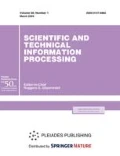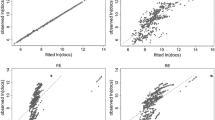Abstract
A program for researching methods and means of forecasting the state of fundamental science is presented. The difficulty of forecasting basic research is indicated and a formal approach to the search for a universal criterion for the demarcation (delimitation) of knowledge is substantiated. It is shown that the forecasting of the development of science is based on an information model of scientific activity. It is proposed to revise methods for the forecasting of the development of science by reconsidering the standard information model of scientific activity. Methods for forecasting fundamental science are differentiated depending on the time period and level of research. The specificity of the tasks of medium-term forecasting of results of fundamental research and the emergence of new directions of development of fundamental science is identified. The typical composition of indicators that can be employed in the formation of the forecast of scientific activity, including composite and hybrid technologies, as well as the expanded use of expert methods, is determined. The significance of the quality of scientometric data for obtaining forecasts of the development of science in the framework of the discussed research program is formulated.

Similar content being viewed by others
Notes
In the Russian Federation, this competence is under the control of the Commission on Combating Pseudoscience under the Presidium of the Russian Academy of Sciences, which was created in 2018.
REFERENCES
Mamchur, E.A., Fundamental science and modern technology, Vopr. Filosof., 2011, no. 3, pp. 80–89.
Antipina, O.V. and Nechaev, A.S., A system of the life cycle of innovations and a comprehensive model for determining the value of the stages of the innovation process, Perspekt. Nauki, 2014, no. 10, pp. 89–96.
Gilyarevskii, R.S., On the scientific literature that reports quantitative data collected during experimental research, Sci. Tech. Inf. Process., 2017, vol. 44, pp. 247–252.
Adibekyan, O.A., Basic, related, and complex sciences, SCI-ARTICLE.RU, 2015, no. 18, pp. 106–111.
Asabina, T.Yu., M. McLuhan’s “global village” as a conceptual problem of modern sociodynamics, Filosof. Sots. Nauki, 2014, no. 2, pp. 39–42.
Kosmarskii, A.A., Kartavtsev, V.V., Podorvanyuk, N.Yu., and Bode, M.M., Tribes and transparency: Perspectives of digital mechanisms of self-organization in Russian science, Monit. Obshchestv. Mneniya: Ekon. Sots. Peremeny, 2019, no. 6, pp. 65–90.
Linden, I.L. and Linden, F.Ch., Open access: The “green path” and the “golden path,” Nauchn. Tekh. Bibl., 2009, no. 7, pp. 30–44.
Granovskii, Yu.V., Can science be measured?, Naukovedenie, 2000, no. 1, pp. 160–183.
Granovskii, Yu.V., Scientometrics at Moscow University, Upr. Bol’shimi Sist.: Sb. Tr., 2013, no. 44, pp. 67–82.
Nalimov, V.V. and Mul’chenko, Z.M., Naukometriya. Izuchenie razvitiya nauki kak informatsionnogo protsessa (Scientometrics. Studying the Development of Science as an Information Process), Moscow: Nauka, 1969.
Kovalev, S.P. and Sorokoletov, P.V., Analysis of scientific approaches to forecasting the prospects of R&D, Nauka Mir, 2016, vol. 2, no. 5, pp. 147–152.
Potapov, A., Technological singularity: What do we really know?, Information, 2018, vol. 9, no. 4.
Pivovarov, D.V., Three paradoxes of forecasting the future, Obraz. Nauka, 2012, no. 4, pp. 118–127.
Vleduts, G.E., Nalimov, V.V., and Styazhkin, N.I., Scientific and technical information as one of the problems of cybernetics, Sov. Phys. Usp., 1959, vol. 2, pp. 637–665.
Mosicheva, I.A., Parfenova, S.L., Dolgova, V.N., Bezrodnova, K.A., Lyagushkina, E.A., Bogatov, V.V., Khaltakshinova, N.V., and Korobatov, V.Ya., A method for predicting a number of publications by an integrated indicator based on the data of Web of Science and Scopus, Nauchn. Tekh. Bibl., 2018, no. 7, pp. 60–83.
Voskresenskaya, N.O., Banks of ideas as a result of foresight: A scientific technology of the information society, in Rossiya: Tendentsii i perspektivy razvitiya. Ezhegodnik (Russia: Trends and Development Prospects. Yearbook), Pivovarov, Yu.S., Ed., Moscow: INION, 2012.
Tyumentseva, A.I., Tools and methods in foresight methodology, Alleya Nauki, 2018, vol. 2, no. 6, pp. 626–631.
Alfimov, M.V., Effective foresight: Symbiosis of expertise and facts, Forsait, 2011, vol. 5, no. 4, pp. 77–78.
Ladykova, T.I., Vasil’eva, I.A., and Zavisha, E.N., Foresight technologies in forecasting the innovative development of the region, Upr. Ekon. Sist.: Elektron. Nauchn. Zh., 2015, no. 4.
Sterkhova, N.S., Characteristics of the presentation of published research results, Vestn. Shadrinsk. Gos. Pedagog. Univ., 2015, no. 3, pp. 11–18.
Lyasko, V.I., Strategicheskoe planirovanie razvitiya predpriyatiya (Strategic Development Planning of the Enterprise), Moscow: Ekzamen, 2005.
Pavlova, A.S., Bibliometric methods: Types, tasks, problems (analytical review), Tr. Gos. Publ. Nauchno-Tekh. Bibl. Sib. Otd. Ross. Akad. Nauk, 2015, no. 9, pp. 20–29.
Evstigneev, V.A., Scientometric studies in computer science, Novosibirskaya shkola programmirovaniya. Pereklichka vremen (Novosibirsk School of Programming. Rollcall of Times), Novosibirsk: Inst. Sist. Inf. im. A. P. Ershova, 2004, pp. 203–215.
Libkind, A.N., Bogorov, V.G., Mindeli, L.E., and Markusova, V.A., An altmetric indicator as one of the indicators of the scientific impact of publications, Vestn. Ross. Akad. Nauk, 2018, vol. 88, no. 9, pp. 811–818.
Rybakov, Yu.L., Golubev, V.P., Divueva, N.A., Medvedev, V.I., and Efimov, B.I., Review of expert technologies existing in the scientific and technical field (from the experience of domestic expert systems), Innovatika Ekspertiza, 2012, no. 2, pp. 173–182.
Simonenko, T.V., Scientometrics: Object, subject, methodology, in Naukometriya: Metodologiya, instrumenty, prakticheskoe primenenie (Scientometrics: Methodology, Tools, and Practical Application), Grusha, A.I., Ed., Minsk, 2018.
Funding
This work was carried out as part of the study on the topic 0003-2019-0001 of the State Assignment of the All-Russian Institute for Scientific and Technical Information of the Russian Academy of Sciences (VINITI RAS) and with the support of the Russian Foundation for Basic Research (RFBR project no. 20-07-00014).
Author information
Authors and Affiliations
Corresponding author
Ethics declarations
The authors declare that they have no conflicts of interest.
Additional information
Translated by K. Lazarev
About this article
Cite this article
Kalachikhin, P.A. Forecasting Basic Research Using Scientometric Data. Sci. Tech. Inf. Proc. 47, 126–132 (2020). https://doi.org/10.3103/S0147688220020100
Received:
Published:
Issue Date:
DOI: https://doi.org/10.3103/S0147688220020100



